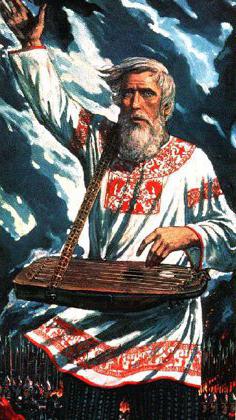The word "epic" is for some reason associated with something huge, large-scale, undeniably great. The first thing that comes to mind is the images of the mighty warriors who cherish Mother Russia, patrol the mighty horses of the state’s border, drive away all sorts of misfortunes. Even the language in which these amazing works are written differs from the ordinary literary! Russian folk epics are an absolutely independent genre of folklore with established traditions and canons. What distinguishes them from ordinary tales and legends?
What it is?
So, epic is an epic song, usually passed down from generation to generation, the main plot of which revolves around a hero who fights against the forces of evil and defends the fatherland with all his might. Usually, the main character has a difficult fate, moreover, he does not immediately come to the realization of his "heroism", but then, when the "silushka" is already whipping through the edge, no one can resist the Russian hero.
The term for this form of folklore was introduced in the thirties of the last century and is taken from the “Words about Igor’s Regiment” (where there is a phrase “bylins of this time”). Most of these traditions were preserved among the peasants of the northern part of Russia. Epics (short works are rare) are most often quite voluminous, as they tell about a long period of time.
History
It is difficult to say when the first historical songs appeared: it seems that they were always among the people. The first documents containing Russian folk epics date from the seventeenth century, and no one can say whether this is due to illiteracy of the population or the fact that such a genre did not exist before.
The first collection of "legends" of the Slavs was created by order of the Englishman Richard James, who was interested in the culture of Russia, however, there were only five epics in it. In the eighteenth century, interest in the genre is growing, there are more authors who create entire collections of folk songs. The peak of interest falls on the sixties and seventies of the nineteenth century, when the ordering of epics came into fashion not by characters, but by storytellers (that's what the people of the northern world call the guardians of oral creativity).
Most often, Russian folk epics were discovered by researchers in Siberia. As a separate genre, the legends of Russian Cossacks stand out.
rules
As with any literary genre, epics are characterized by their own canons. They say that earlier they were performed to the accompaniment of ghuslles and melodies, although there were few of them, but in combination with the narrator’s voice they sounded really amazing. Such a phenomenon as short epics did not exist at all, therefore, each story was delayed for long hours, often it was interrupted for the rest of both the listeners and the narrator.

The epic genre of these works suggests a solemn style of narration. It was achieved with the help of repetitions (the well-known “a long time ago” came from there) and synonyms (live-live). Very often whole phrases were repeated - at the end of the line and at the beginning of the next. Typically, storytellers did not focus on specific places, it was much more important for them to talk about “heroic” affairs, the process of saddling a horse, for example, epics contain detailed descriptions of the harness of horses, equipment of the hero himself, etc. Frequent and exaggeration, emphasizing certain qualities of heroes. Tellers adored epithets (glorious hero, rotten enemy), some of which eventually became phraseological units (hot blood). To highlight the “bright side” again, diminutive and suffix suffixes (Alyoshenka) were used, while for negative heroes the suffixes “enlarging” (kingdom) were used.
Russian folk epics are presented in the present tense; they do not have references to the past or the future. In addition, they usually consist of three compositional parts: a chorus (a kind of introduction that has little to do with the narrative itself), a conception (the plot itself), and an ending.
Silushka is heroic
The most famous genre of this element of folklore are epics about heroes. Tales of love for Russia, dedication, true honor and friendship have always been popular. Characters such as Alyosha Popovich, Dobrynya Nikitich and Ilya Muromets are known to every Russian-speaking person. They are popularized even in cartoons, so that the smallest ones know that "superheroes" are not only in America, but also in Russia. Stories about the heroes bring up in children a love for the Motherland, an awareness of its value, showing at the same time the historical life of the Old Russian state.
Conclusion
The culture of Russia is amazing and rich. Epics, Russian folk tales, proverbs and sayings, various riddles - only a small part of all this wealth. Much remains unexplored to the end, much remains incomprehensible to modern man, but in no case can the value of folklore be denied. Without the past, the present is impossible and the future is impossible, and only then will the people develop correctly when they learn to value their history.